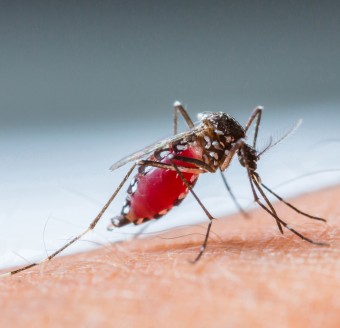Where Mosquitoes Go During the Daytime
 Mosquitoes are the bane of anyone who steps outside during the hours around dusk and dawn. If not caught in time, the creatures take a drink of blood, and then leave behind an itchy bump, and maybe a disease or two. But very rarely do the insects come out for a meal during daylight hours unless the sky is cloudy. So where do mosquitoes go during the daytime?
Mosquitoes are the bane of anyone who steps outside during the hours around dusk and dawn. If not caught in time, the creatures take a drink of blood, and then leave behind an itchy bump, and maybe a disease or two. But very rarely do the insects come out for a meal during daylight hours unless the sky is cloudy. So where do mosquitoes go during the daytime?
First things first, the only mosquitoes that consume blood are female. Also, your blood does not provide them with anything they need nutritionally for their own health. Rather, they consume the blood of humans and other animals as a way to get certain nutrients needed for the proper development of their eggs. Yes, your blood is being used to make more mosquitoes.
Once the female has safely acquired a “blood meal,” she will rest for a few days while her body develops the eggs from digesting the proteins and iron in the blood, producing amino acids which are used as the building blocks for the synthesis of the egg yolk proteins.
Though people are often bitten, most female mosquitoes actually prefer to feed on livestock and small mammals if given the choice. Male mosquitoes have no need for this sort of thing, so they do not indulge in the highly risky behavior that is sucking the blood of larger animals. If you’re curious as to what mosquitoes actually eat for their own nutritional needs, both male and female mosquitoes primarily feed on nectar from plants, much like honeybees, who incidentally seem to know the world is round and can even do some remarkably complex math in their heads.
The majority of mosquitoes feed around evening and at dawn. The dry heat that often occurs during daylight hours in the summer can quickly kill mosquitoes by causing them to become dehydrated. As such, most mosquitoes rest or sleep in a dark, sheltered place during the daylight hours, preferably an area that is relatively humid, such as tucked inside vegetation like plants and grass. They also can be found sleeping the day away inside man made structures like culverts or barns, or natural shelters such as caves, holes in the ground, and holes in trees.
If you liked this article, you might also enjoy our new popular podcast, The BrainFood Show (iTunes, Spotify, Google Play Music, Feed), as well as:
- Why Does Itching a Mosquito Bite Make It Worse?
- Why Cats Like Catnip
- Where Do Insects Go in Winter?
- Spiders and Webs – Why Don’t They Get Stuck?
- Do Earwigs Really Lay Eggs in Your Ears?
Bonus Facts:
- Mosquitoes have four stages to their life cycle: egg, larva, pupa, and adult. During the first three stages, they live entirely in water. During the larval stage, they feed on algae and other microorganisms and must frequently bob to the surface of the water to get air. During the pupal stage, they do not eat, but do sit at the surface and breathe air through two small tubes. At the end of the pupal stage, the mosquitoes crawl to a dry place to rest and dry off, with the males about ready to start mating and the females ready to start their adult lives as bloodsucking human killers.
- Mosquitoes annually transmit diseases to over two-thirds of a billion people or around 1/10th of the human population. About two million of these people die annually from whatever disease they received through the mosquito bite.
- Adult female mosquitoes can typically live 4-8 weeks, but in the wild tend only to last about 1-2 weeks, due to a variety of factors including temperature, humidity, food sources, and predators. Adult male mosquitoes typically only live a few days after they mate, which tends to happen quite quickly after they reach adulthood.
- There are seemingly always exceptions to rules, and mosquito feeding times are no different. For instance, the Asian tiger mosquito is usually only active during the day, though it can be active at night if there is light in the area or they are indoors. They fall into the category of persistent biters, but they are cautious. Asian tiger mosquitoes move away when their prey makes a sudden movement. They prefer to bite stationary or slowly moving people and animals.
- Most mosquitoes breed in a temporary body of water that has been standing for at least a week. Large, established bodies of water such as lakes and ponds tend not to breed as many mosquitoes due to the presence of predators such as fish, other insects, and salamanders. Only the dark rice-field mosquito can breed in less than a week, so any stagnant water that has been around for less than seven days most likely has yet to produce mosquitoes. That means emptying out areas of standing water, such as bird baths, helps to prevent mosquitoes from breeding.
| Share the Knowledge! |
|





One comment